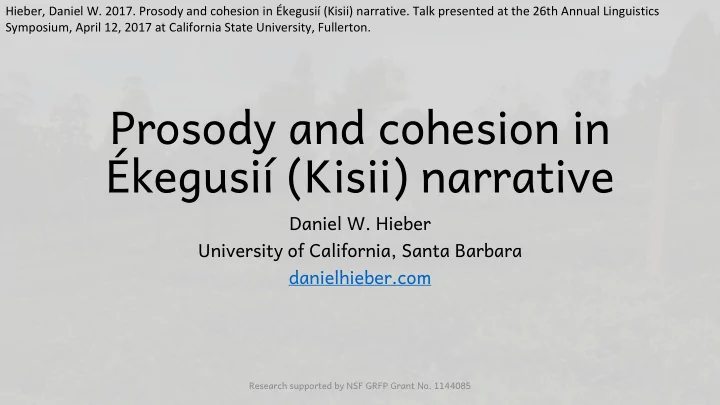

Hieber, Daniel W. 2017. Prosody and cohesion in Ékegusií (Kisii) narrative. Talk presented at the 26th Annual Linguistics Symposium, April 12, 2017 at California State University, Fullerton. Prosody and cohesion in Ékegusií (Kisii) narrative Daniel W. Hieber University of California, Santa Barbara danielhieber.com Research supported by NSF GRFP Grant No. 1144085
What is prosody? • intonation • What do these things have to do with one another? • tempo / rhythm • loudness • pause • syllable structure • voice quality / phonation
What goes on the list? “there is no way of knowing ahead of time how the phonetic features loosely referred to as “prosodic” – pitch, duration, and so on – are going to be put to phonological use in any given language.” (Himmelmann & Ladd 2008: 253) The phonetic cues that signal phonemic distinctions in one language may have purely prosodic functions in another, and vice versa. How does one decide when a given linguistic feature is functioning prosodically or not?
Prosody The set of phonetic and phonological cues that speakers use to give cohesion to their discourse, by signaling the transitions from one unit of discourse to the next, the relations that hold between those units, and their relative prominence. Prosody is fundamentally a discourse phenomenon • Prosody is a tool that speakers use to structure their speech • (but not the only tool – works in tandem with morphosyntax) •
Ékegusií (Kisii) Bantu, Niger-Congo
Map taken from Nash (2011)
Ékegusií (Kisii; Bantu, Niger-Congo) Endangered language of southwest Kenya • Few speakers under 30 • 2.2 million ethnic Gusii people, ~600,000 speakers • Surrounded by Nilotic languages • Tonal: H vs. L tone (L orthographically unmarked) • Data: 24 folktales; lexical database with audio (14,000 • words)
Pause
Pauses in a single text Introduction of narrative Complicating Movement Climax and participants action toward climax 0.7 0.6 Pause (seconds) 0.5 0.4 0.3 0.2 0.1 0 Time
Vowel elision êndo ɛ́gatɛ́ɛ́bâ rɛɛrɔ ígo íngôôchâ kôgɛnda íntɛ́gɛ́ lion it.said today so I.am.going to.go I.trap [êend#ɛ́ɣatɛ́ɛ́ β â ɾɛɛɾɔ́#ɣó#ôŋgôôtʃá kɔɣɛɛndá#ântɛ́ɣɛ́] ‘The lion said, “Today I’ll go and lay a trap.”’
Vowel elision índôrê ômonto ôgoochâ ôria chínchûgû chíânɛ́ I.see person who.goes to.eat ground.nuts my [îndôɾ#ômoont#ôɣootʃ#ôɾí#tʃîintʃûɣú t͡ʃîânɛ́] ‘[…] so that I see who comes to eat my ground nuts.’
Vowel elision
Lack of vowel elision at transition into reported speech
Pitch Reset
Lack of pitch reset indicating narrative continuity
Isotony
Lexical repetition without isotony
Isotony without lexical repetition
Isotony across multiple phrases
High Register • The day came that the invited visitors came. • The food was prepared there. • The meats were there. • The breads were there. • The mandazi [donuts] were there. • People ate and drank sodas. • These people drank tea with mandazi. • They rejoiced and sang well. • It reached the evening.
Prosody as Cohesion Avoids problems with the list approach • Ofgers a language -general functional defjnition of prosody • which helps identify when a phonetic feature is being used prosodically, and when it is not Provides a framework for future typological studies of • prosody
References Himmelman , Nikolaus P. & D. Robert Ladd. 2008. Prosodic • description: An introduction for fjeldworkers. Language Documentation & Conservation 2(2). 244–274. http://scholarspace.manoa.hawaii.edu/handle/10125/4345. Nash, Carlos. 2011. Tone in Ekegusii: A description of • nominal and verbal tonology . Ph.D. dissertation, Department of Linguistics, University of California, Santa Barbara.
Recommend
More recommend